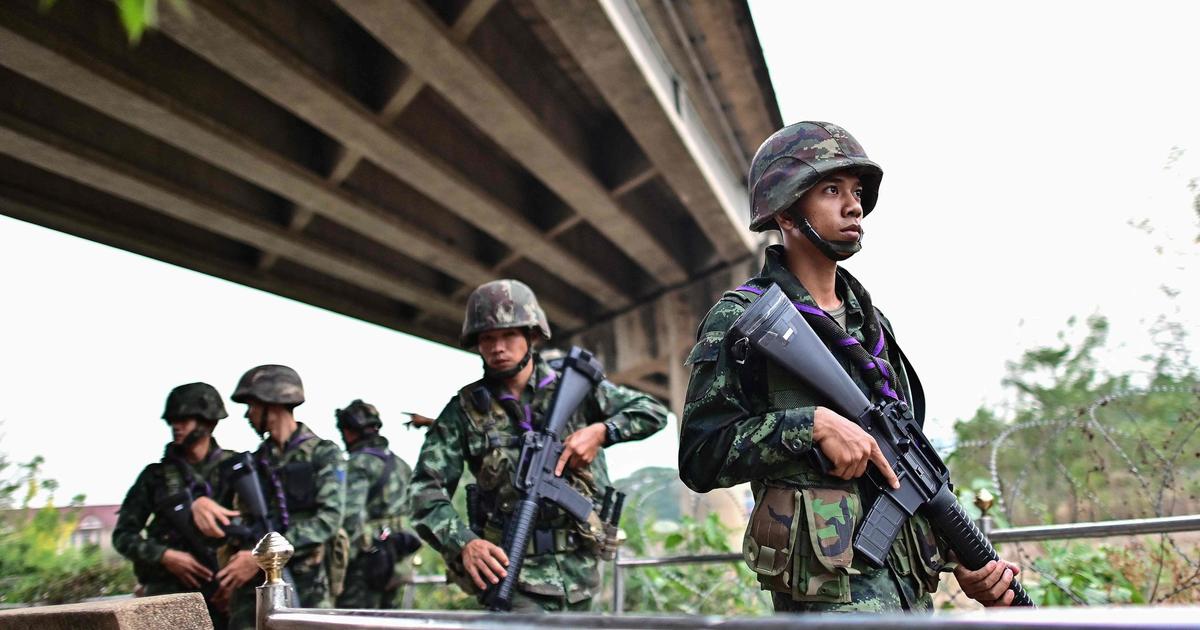Dozens of people queue in long lines to withdraw money from ATMs in Yangon city on April 29.STRINGER / EFE
Three months after the coup that deposed the civilian government of Nobel Peace Prize Aung San Suu Kyi, and with more than 750 deaths due to military repression, the Burmese economy is in free fall.
The uncertainty that hangs over the future of the country, with the financial system paralyzed due to the massive strikes called by opponents to the violent response of the generals, among many other factors, may lead the country to contract to 20% in 2021. A forecast that returns Myanmar (the former Burma), one of the promises of Southeast Asia when it began its democratic transition in 2011, to the darkest and most impoverished time of the decades of military dictatorship.
More information
Six dead in Myanmar on return from protests three months after coup
Just as the military led the country to ruin for half a century (1962-2011) with economic policies that had a disastrous effect on its growth, the following years of openness were a ray of hope for Myanmar. The civil government of Suu Kyi, de facto leader since 2015 and re-elected in the November elections - which the military declared fraudulent as an excuse to carry out the coup - carried out economic reforms, helping to attract investment to a country that had lived in isolation. of the international community until then. According to the World Bank, poverty was cut by almost half: from 42.2% in 2010 to 24.8% in 2017. And since the United States and European countries lifted sanctions against the former Burma in 2012, annual growth had been between 5% and 8%.
A radically different panorama from the current one;
If Myanmar had already suffered the shock of the covid-19 pandemic in 2020, the coup on February 1 has given it the final blow.
Fitch Solutions, a subsidiary of the eponymous agency, predicts a GDP contraction of 20% this year, double that anticipated by the World Bank.
A study at the end of April by the United Nations Development Program (UNDP) warns that, if nothing is done to remedy it, the combination of the effects of the coronavirus and the consequences of the coup could push people into poverty. 12 million Burmese, resulting in a total of 25 million - almost half the country's population - living below the poverty line in 2022, something not seen since 2005.
Street protests
Many factors are driving the former Burma into bankruptcy. The coup triggered street protests throughout the country, violently repressed by the Army and the police, causing many companies to suspend their services due to insecurity. The protests are also accompanied by a civil disobedience movement that has called for massive follow-up strikes, paralyzing many services, from the most basic to the most sophisticated. The crisis has collapsed the banking system, closing branches and preventing companies from paying their workers, or the clients themselves from taking money from ATMs. Many workers also refuse to pay taxes because they consider that the military government is illegitimate and do not want to contribute to its permanence, warns Romain Caillaud in a note,Burmese economic policy expert from the Institute for Southeast Asian Studies (ISEAS-Yusof Ishak).
More information
Southeast Asian leaders urge Burmese coup junta chief to end violence
The list goes on: the internet is practically cut off in the country by orders of the Board, with the aim of stopping the call for protests and controlling the narrative of what happens, making the operation of many businesses almost impossible.
Foreign trade suffers (reporting 13,031 million euros between October and April, below the nearly 17,000 million registered in the same period of the previous year, according to official figures).
Likewise, a growing number of multinationals are evaluating their presence in Myanmar, such as the Japanese Kirin or the Australian Woodside Petroleum, which have announced the reduction of their activities.
The local currency, the kyat, has depreciated 14% since the military intervention.
Food insecurity is also pressing. According to the World Food Program (WFP), up to 3.4 million people will find it difficult to stock up in the next six months, almost 1.5 million more than the 2.8 million at risk before the coup. “More and more people are losing their jobs and cannot afford to buy food. A collective response is required to alleviate immediate suffering and prevent even more alarming deterioration, ”Stephen Anderson, WFP Myanmar Director, said in a statement.
Amid strikes and violent repression by the security forces, doing business has become virtually impossible in Myanmar, despite forced attempts by the Board to give the appearance of continuity by appointing well-known private sector figures to key ministerial positions. “Until some kind of democracy returns, the Burmese economy faces a very difficult future, becoming increasingly isolated by multinationals from the Organization for Economic Cooperation and Development (OECD) countries. There is also a significant risk that there will be more economic sanctions by the United States, the European Union and other democracies, ”warns Rajiv Biswas, chief economist for Asia Pacific at the consultancy IHS Markit.
With no signs of the military giving up power or making weighty concessions in the short to medium term, with Suu Kyi and members of her government in custody, Myanmar is heading relentlessly towards the precipice. A group of independent Burmese economists (IEM) has published a study recommending ways to pressure generals to back down. According to their analysis, the military's greatest vulnerability - behind powerful conglomerates in key sectors - lies in blocking their access to foreign reserves through sanctions and other measures, in addition to attacking their profits in sectors such as natural gas and precious stones. . Economists estimate that the military controls foreign exchange reserves of at least $ 4 billion (€ 3.303 billion),about two-thirds of the total.
The authors of the study, quoted by the Japanese media Nikkei, conclude that, by doing so, the Board could reduce its annual profits by up to 2 billion dollars (1.65 billion euros). "This could put pressure on them to change their priorities and, instead of seeking to meet their needs, put public service first," he stresses.

/cloudfront-eu-central-1.images.arcpublishing.com/prisa/BKRD2K3RD5HMVGCVROWZBDNKBI.jpg)






